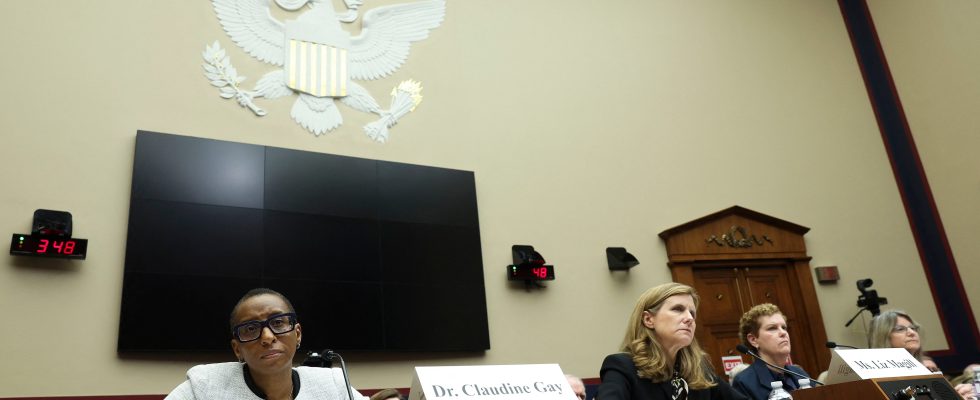It was a hearing that caused a lot of talk in the United States. This Tuesday, December 5, the American Congress, more precisely the Education Committee of the House of Representatives, called to testify under oath the presidents of the universities of Harvard (Claudine Gay), Pennsylvania (Elizabeth Magill) and MIT ( Sally Kornbluth). On the agenda, a very tense subject across the Atlantic since the start of the war between Israel and Hamas: anti-Semitism within American faculties, while numerous tensions and even clashes between pro-Palestinian students and Pro-Israeli protests have broken out in the United States since October 7.
Elected officials from the Republican Party notably took control during this hearing, believing that American universities were far from doing enough to fight against anti-Jewish hatred. “The anti-Semitism that we have observed on your campuses did not come out of nowhere,” protested Virginia Foxx, president of the commission and elected Republican from North Carolina, adding that this meeting was “the opportunity to respond and atone for the numerous instances of hateful anti-Semitism on your respective campuses, which have deprived students of the safe learning environment they deserve.”
The three presidents defended themselves against these accusations, explaining that Jewish students had been questioned about their fears, that working groups on anti-Semitism had been formed, and that codes of conduct had been consulted. They also recalled having condemned “unequivocally” the October 7 attacks by Hamas.
“It depends on the context”
But one sequence was particularly striking, when another elected Republican, Elise Stefanik, representative of the State of New York and herself a Harvard graduate in 2006, asked a seemingly simple question to Sally Kornbluth, president of the University of Massachusetts: “Is calling for the genocide of Jews a violation of MIT’s code of conduct or rules regarding intimidation or harassment?” The director then replied: “If he targets individuals who do not make public statements.” The elected Republican then insists: “Yes or no?” Sally Kornbluth finally responds, “I have not heard calls for the genocide of Jews on our campus. […] This would be investigated as harassment, if it is pervasive and severe.”
When confronted with the same question at the same time, the directors of the University of Pennsylvania and Harvard, Elizabeth Magill and Claudine Gay, more or less answered the same thing as their colleague. “If it is targeted and severe or pervasive, it is harassment. It is a decision that depends on the context,” replied the first, while the second also explained that “it depends on the context” and that “Anti-Semitic rhetoric, when it escalates into conduct that amounts to intimidation, harassment, intimidation, is actionable conduct, and we are taking action.”
Responses considered too timid and far from sufficient for elected Republican Elise Stefanik, who protested that it was “the simplest question to answer yes to”. She also immediately called for the resignation of the three university presidents.
An unprecedented number of investigations opened
The subject of anti-Semitism in American universities has been particularly sensitive since the Hamas terrorist attack on October 7 and the resurgence of the Israeli-Palestinian conflict. As relayed by CNN, the American Department of Education has opened an unprecedented number of investigations into alleged incidents of hatred on university campuses, whether for anti-Semitism but also for “Islamophobia”. Eight universities, including Harvard and Penn, as well as four school districts are under investigation.
Among recent actions, the faces and names of some students allegedly linked to anti-Israel statements were posted on billboards near the Harvard and Columbia campuses. A Cornell University student was indicted for writing a series of online messages threatening to kill and harm Jewish students.
The situation has even become “untenable” for the Office for Civil Rights, responsible for managing discrimination cases, and which does not have the human resources to manage this increase in cases. A subject highlighted by an elected representative of the Democratic Party, Joe Courtney, who criticized the Republican Party’s proposal to reduce the organization’s budget by 25%, denouncing that this budget cut would “paralyze the ability to fight against anti-Semitism” on campus.
